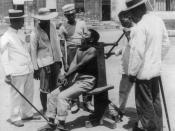Jaime L. Thomason PHIL 140/Professor Skees Final Paper 16 December 2012
Death Penalty
Since the beginning of crime in America, the correctional policy has always geared itself toward a "get tough" mentality regarding crime and punishment. Over the last several decades, all sides of the political realm have been supporting and suggesting measures to increase the safety in America and decrease the amount of crime on our streets. The most punitive type of punishment in the United States is perhaps arguably the death penalty. Unlike other types of punishments such as life in prison, the death penalty is the only punishment with a staunch opposition that continues to fight against its use. That being said, strong public support is the number one reason the death penalty continues to be used as a form of correction policy in our criminal justice system. If our country took a "no tolerance" stance toward capital crimes, we would send criminals a message of deterrence and the government would show our country that human life has more value to them then they currently portray.
Capital punishment, also called death penalty, is the execution of an offender sentenced to death after conviction by a court of law of a criminal offense. Capital punishment should be distinguished from extrajudicial executions carried out without due process of law. The term death penalty is sometimes used interchangeably with capital punishment, although imposition of the penalty is not always followed by execution (even when it is upheld on appeal) because of the possibility of commutation to life imprisonment (Capital Punishment). Many death penalty supporters view the punishment with an "eye for an eye" mentality. Many feel it is an opportunity for the victim's loved ones to not only get the justice they deserve but also achieve some sort of closure.


